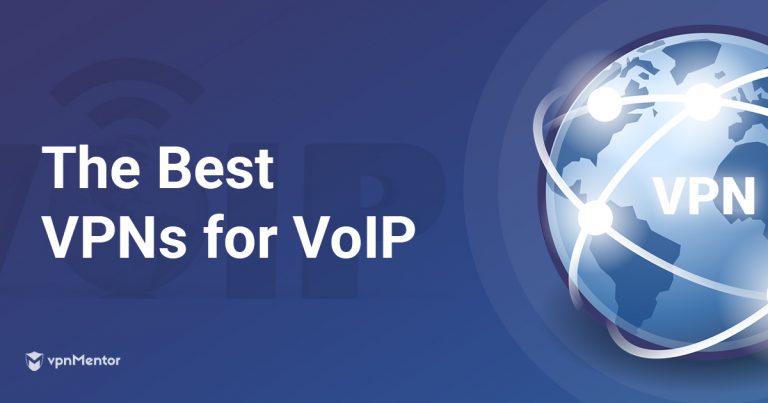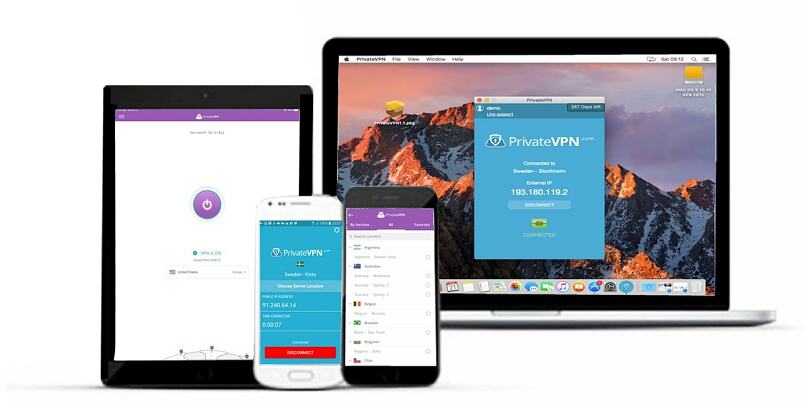Complete Guide to Voip VPN & How To Choose (2025)
VoIP changed the nature of communication, giving you the opportunity to talk to anyone, anywhere in the world, at lower costs and with far greater privacy than traditional phone services had ever offered.
Voice over Internet Protocol (VoIP) calls convert analog signals (sound) into digital signals that are sent over the internet. These signals can be encrypted at both ends, making it much harder for a third party to hear, track, or record what is said.
So if VoIP calls can be encrypted to give you security and privacy, why do you need a VPN? Read on to learn about government and private industry efforts to suppress VoIP use, how a VPN protects your VoIP calls, and which VPNs are the best ones to use.
Best VPNs for VoIP - Quick List
- ExpressVPN —
With secure and stable connections, obfuscated servers, multiple encryption protocol options, and ultra-fast speeds, ExpressVPN is an ideal choice for VoIP. - IPVanish—
IPVanish offers Impressive speeds, customizable settings, and a growing network of servers to give you complete access to your chosen VoIP service from anywhere. - CyberGhost—
CyberGhost is registered in a privacy-friendly country and offers several protocol options, along with unlimited traffic and bandwidth. - PrivateVPN—
Dedicated mobile apps, no bandwidth or downloading restrictions, and user-friendly interfaces make PrivateVPN a solid, affordable option to protect your VoIP calls.
Editor's Note: We value our relationship with our readers, and we strive to earn your trust through transparency and integrity. We are in the same ownership group as some of the industry-leading products reviewed on this site: Intego, Cyberghost, ExpressVPN, and Private Internet Access. However, this does not affect our review process, as we adhere to a strict testing methodology.
Why You Need a VPN for VoIP
VoIP allows you to communicate with anyone who has a VoIP or phone connection, anywhere in the world – as long as you can access the service. Unfortunately, VoIP services are either restricted or blocked in several countries.
And when you lose access to VoIP, you lose a lot. For one thing, VoIP calls are generally cheaper than other forms of communication, including landline and mobile phone services.
VoIP is also more reliable and often offers better call quality than cell service networks, giving you the ability to communicate in areas where cell phone signals are weak.
Furthermore, most VoIP providers use end-to-end encryption on their services, which means that if anyone spied on the call, they couldn’t hear what you said. This protection is ideal if you are discussing financial matters or sensitive issues.
Unfortunately, the two aspects that make VoIP so popular – affordability and privacy – have also led to the restrictions and blocks on VoIP services. In some countries, telecom companies pressure governments to restrict VoIP use to protect their profits.
In other countries, governments block VoIP services because they can be used to get around censorship policies, exchange politically sensitive information, or discuss illegal or terror-related activities without the possibility of surveillance.
How a VPN Gets You Access and Secures Your VoIP Calls
A Virtual Private Network (VPN) can help you bypass VoIP restrictions and blocks, while providing anonymity and security for all your activity on the web.
A good VPN stops anyone from seeing what you are doing online or hijacking your connection by hiding your IP address and encrypting all incoming and outgoing data. VPN encryption complements VoIP encryption, making your calls that much safer.
By assigning you a new IP based on the server location you choose, a VPN also disguises your physical location, so spying agencies can't track where you are or where you're calling. You'll appear to be using the service in a country where it isn't restricted (e.g. the US or UK).
Furthermore, VPNs can help you get around ISP speed throttling, improving call quality.
However, all of this can only happen if you choose a VPN that is suitable for use with VoIP services. There are several excellent choices that performed beautifully in our VoIP tests.
What to Look For in a VPN for VoIP
The perfect VPN for use with VoIP services can bypass any blocks or restrictions on the service. It also needs to provide a secure, anonymous connection and excellent call quality. To achieve all this, your VPN needs to have at least the following features:
- Servers in countries where VoIP services are not restricted.
- Excellent encryption with additional security features like a kill switch.
- The ability to go undetected. If surveillance agencies determine that your traffic is being tunneled through a VPN, they could block it. Obfuscated servers, a range of port choices, and a variety of protocol options can help your call stay invisible.
- Strong data protection and anti-logging policies to prevent attempts to access your information or activity history.
- Excellent speeds. Fast and stable connections reduce the risk of latency, and therefore of poor call quality or dropped calls.
- Anonymous payment options. While not essential, paying anonymously can help if you are setting up your VPN in a country where VPN use is restricted.
- A free trial or money-back guarantee so you can test the service to see if it works for you.
Here Are the Top Four VPNs for VoIP
1. ExpressVPN

Tested April 2025
ExpressVPN is based in the British Virgin Islands, putting it outside the jurisdiction of the Five-Eyes countries. Founded in 2009, the company is recognized as an advocate for privacy and internet freedom.
ExpressVPN’s excellent customer services, superb features, and fast speeds are just some of the positives that are highlighted by its ever-growing fan base.
Key Features
- 3,000 servers, including obfuscated servers, across over 105 countries
- Unlimited bandwidth and downloads with some of the fastest speeds available
- Dedicated mobile apps
- 256-bit AES encryption with PPTP, L2TP/IPSec, OpenVPN, and many more protocols
- DNS/IPv6 leak protection, kill switch, strict no-logging policy, and split tunneling
- 24/7 customer service
- Offers anonymous payment options
- 7-day free trial on mobile devices; all users benefit from a 30-day money-back guarantee*
2. IPVanish
IPVanish offers a configuration menu that allows you to easily change connection protocols. Happy users emphasize its easy-to-use apps and dedicated approach to privacy and security.
Key Features
- 2,400+ servers across 109 countries
- 256-bit AES encryption and SOCKS5 web proxy
- IKEv2, L2TP/IPSec, and OpenVPN protocols
- DNS leak protection, automatic kill switch, and no-logging policy
- Unlimited traffic and bandwidth, as well as unlimited server switching
- 30-day money-back guarantee
3. CyberGhost
CyberGhost combines a dedication to privacy with German engineering. The company was founded in privacy-friendly Romania in 2011 and offers a reliable, secure, and anonymous service.
CyberGhost’s quick connections, intuitive interface, and range of servers are just some of the key points highlighted in its many excellent reviews.
Key Features
- Over 11,690 servers across 100+ countries
- Unlimited traffic and bandwidth along with stable speeds
- 256-Bit AES encryption with PPTP, OpenVPN, and L2TP/IPSec native protocols
- DNS leak protection, no-logging policy, and kill switch
- Offers anonymous payment options
- 7-day free trial on iOS and Android, free trial available for Windows, and 45-day money-back guarantee on all platforms
4. PrivateVPN
PrivateVPN provides stable connections and uninterrupted service. Reviews by users highlight these benefits, along with the provider’s commitment to privacy and security, as key reasons why PrivateVPN is a top choice for use with VoIP services.
Key Features
- 200 servers across 63 countries
- 2048-bit encryption with PPTP, IPSec, IKEv2, L2PT, and OpenVPN protocols
- Steady speeds with unlimited bandwidth and downloading
- Virtual remote help makes installation effortless
- Offers anonymous payment options
- 7-day free trial and 30-day money-back guarantee
Summary
If you aim to use VoIP services in a country where they are either restricted or blocked, having an appropriate VPN is essential. It's also highly advisable to use one when making calls to or from a nation with intensive internet monitoring.
Even in regions where VoIP usage poses fewer issues, employing a dependable VPN can significantly enhance the security and privacy of your calls. Additionally, using a VPN can lead to cost savings by enhancing call quality, thereby eliminating the need to repeat yourself or frequently restart calls.
To learn more about how a VPN can improve your security and privacy online, check out our complete Guide to VPNs. To explore other great VPN options for streaming, torrenting, and all your online activity, check out our Top 10 VPN reviews.
Your data is exposed to the websites you visit!
Your IP Address:
18.116.60.124
Your Location:
US, Ohio, Columbus
Your Internet Provider:
The information above can be used to track you, target you for ads, and monitor what you do online.
VPNs can help you hide this information from websites so that you are protected at all times. We recommend ExpressVPN — the #1 VPN out of over 350 providers we've tested. It has military-grade encryption and privacy features that will ensure your digital security, plus — it's currently offering 61% off. Editor's Note: ExpressVPN and this site are in the same ownership group.







Please, comment on how to improve this article. Your feedback matters!